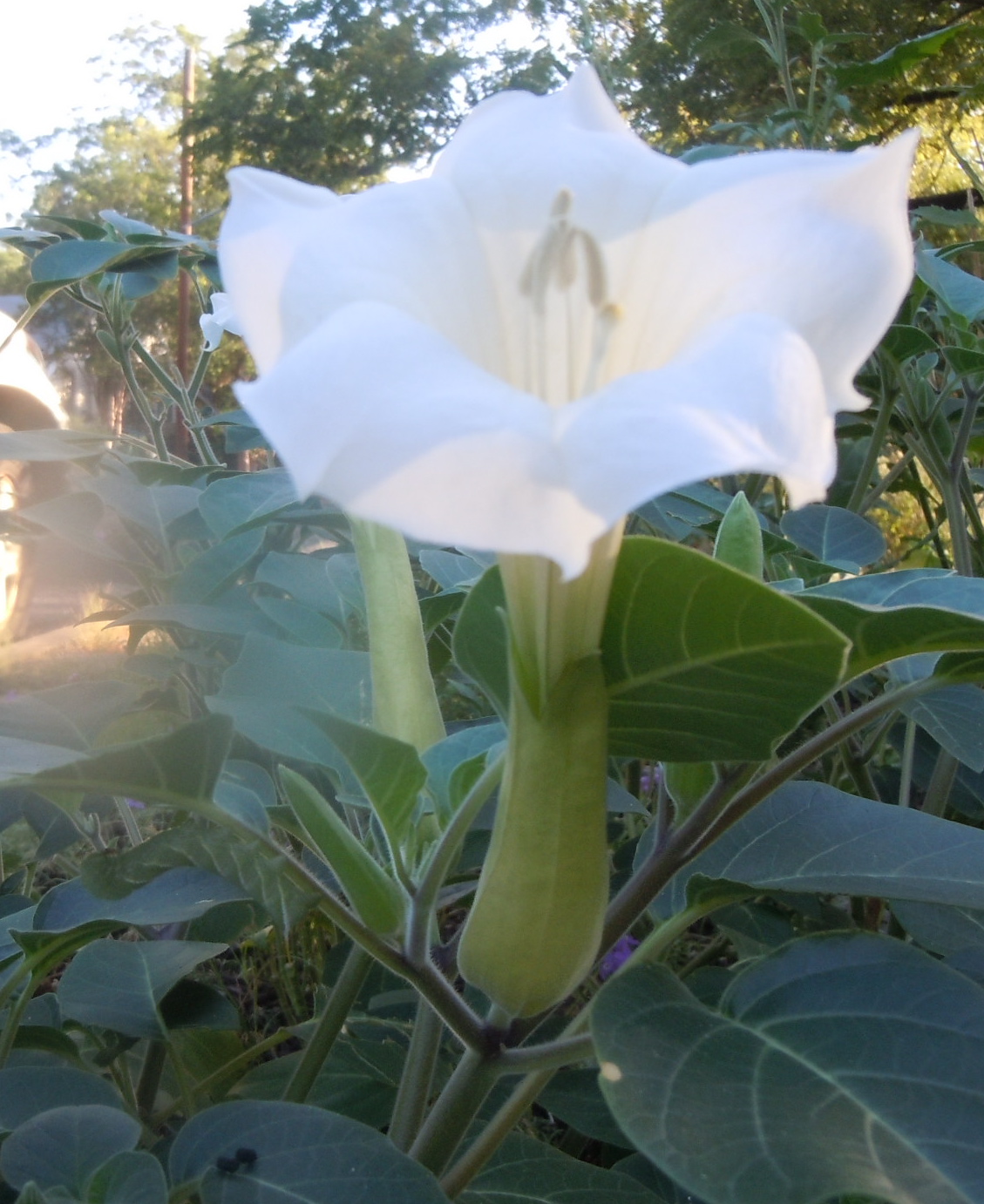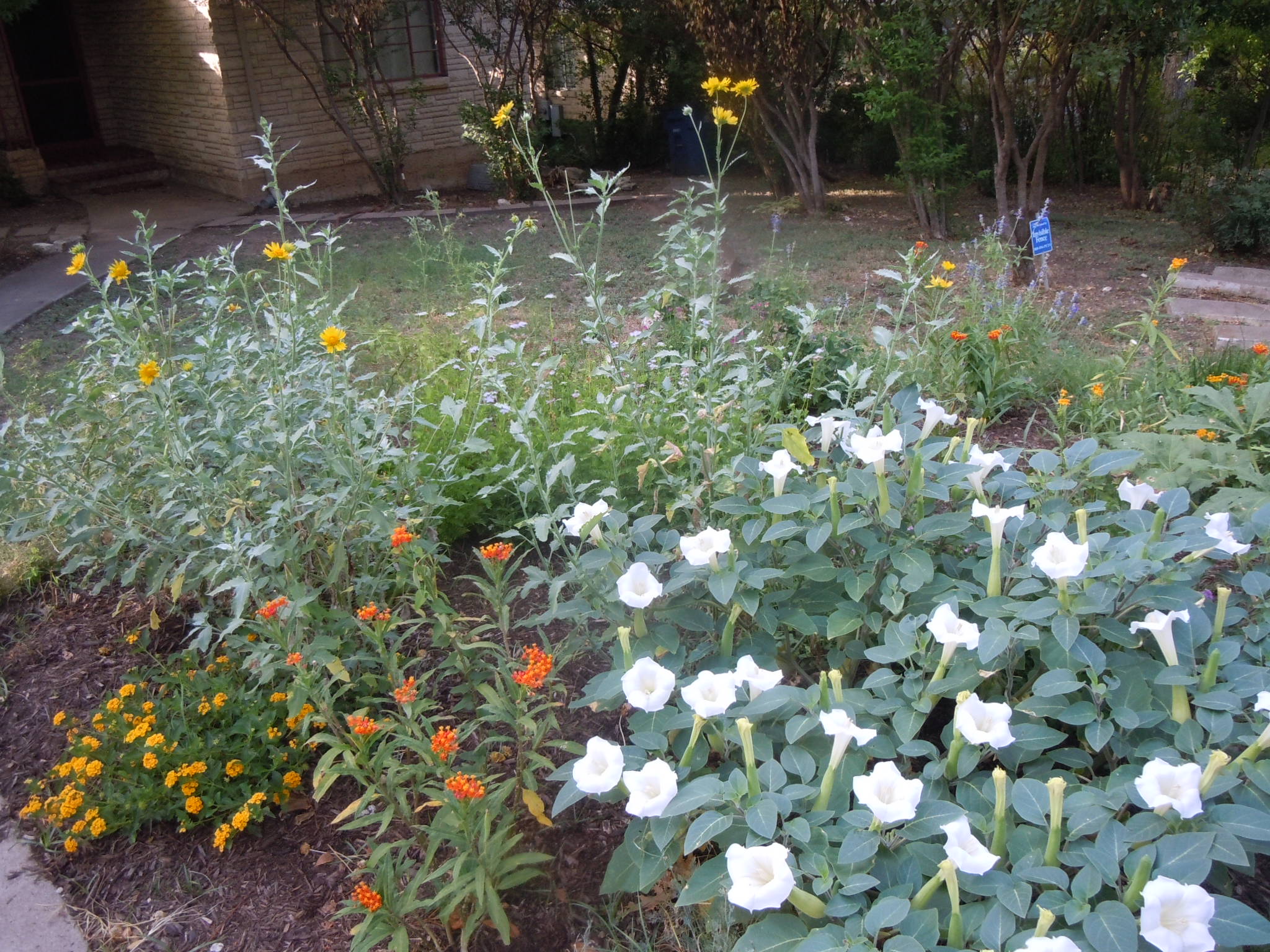With its elegant white trumpet flowers, spiny seed capsules, and fragrant evening blooms, Jimsonweed ranks as one of my favorite butterfly garden plants.
The native datura inoxia partners well with another favorite, Cowpen Daisy. Plant them together and you’ll have sprays of yellow and white blooms throughout the scorching summer, well into October. Both plants gracefully defy our brutal heat, need little water or care, resist disease and pests and attract butterflies and moths.
Jimsonweed climbs to three feet and spreads an equal distance. It creates a handy shady mass that protects less sturdy plants. Up until this past week, Jimsonweed’s shade shielded verbena from frying and saved my tropical milkweed, too. The plant is versatile, attractive and easy-to-grow.

Jimsonweed bloom. Do you see the caterpillar?
What else does this member of the potato family have to offer?
Its spiny seed pods provide an unusual garnish–or should I say gardenish? The thorny balls would make delightful earrings, or at least play a starring role in an exotic ikebana flower display.
As summer wears on, the walnut-sized pods turn from green to brown, spreading seed wantonly in the garden, making this durable perennial almost impossible to defeat once established. The lush, large leaves of Jimsonweed also exude a chocolatey smell when watered or handled.
Another bonus: the captivating Sphinx moth, whose large size and brazen daytime flying cause it to be confused with small hummingbirds, hosts on Jimsonweed. Sphinx moth caterpillars have a reputation with tomato gardeners as the despised tomato or tobacco hornworm, which is beautiful upon close inspection. Look for it in the photo of the Jimsonweed bloom, above.

August butterfly garden: Cowpen Daisy, Jimsonweed, tropical milkweed, Texas lantana
Underappreciated Jimsonweed does have a down side. As a member of the nightshade family, it contains tropane alkaloids, the same toxins as belladonna, used in ancient times on poison-tipped arrows. All parts of Jimsonweed are poisonous. Native Americans used the leaves as a painkiller and as an hallucinogen.
Recent reports have reckless teens using Jimsonweed as a cheap high, but they should beware. Hospital stays, even death, can result.
Jimsonweed’s namesake may represent one of the first instances of ethnobotanical warfare in American colonial history. Amy Stewart explains in her delightful book, Wicked Plants, that in Jamestown, Virginia, in the late 1600s, “British soldiers arrived to quell one of the first uprisings at the fledgling colony and the settlers remembered the toxic plant and slipped datura leaves into the soldiers’ food.”
They survived, but hallucinated severely for eleven days, giving Virginia colonists a temporary upper hand. The assisting plant became known as Jamestown weed, and later, Jimsonweed.


Wonderful article! Noticed my Jimsonweed plant closest to my front door had about 100 blooms on it open this morning as I took off to walk to work… It’s amazing how large and lush it is. I love the purple-tinted soft fuzzy stems too! Also, a reminder if anyone is looking for a start of seeds for the native species listed, here they are from Native American Seed (local Texas seed company).
Jimsonweed: http://www.seedsource.com/catalog/detail.asp?product_id=3063
Cowpen Daisy: http://www.seedsource.com/catalog/detail.asp?product_id=3054
Native Lantana: http://www.seedsource.com/catalog/detail.asp?product_id=3083
Talayote (milkweed family): http://www.seedsource.com/catalog/detail.asp?product_id=3172
Butterflyweed (milkweed): http://www.seedsource.com/catalog/detail.asp?product_id=3139
Thanks for the info, Emily. Curious what your fave “underappreciated” butterfly garden plant is.
Interesting piece–took me about 5 minutes to find the caterpillar. GREAT story about the etymology of Jimsonweed! That one’s going to come out a a cocktail party some night.
Ken, I have a Sphinx Moth cocoon with your name on it.
[…] coins unwrap, naked wings unfold, the rare sphinx moth is revealed. Sticking as static to Jimsonweed’s decedent edges. Hair […]
I grow this for its beauty, it is beyond beautiful when they all open at night under a full moon, I just love it, but I respect its danger..
It is a nightmare on my 2 acre property. Can’t get rid of this nasty plant.
I LOVE Datura plants! And I encourage them to grow in my garden. There are plenty of plants you shouldn’t eat, including the leaves of rhubarb. The flowers are beautiful and the pods are really cool. They used to be used in witches brews, which I find enchanting. There are all these sites on the internet saying to pull it out because it’s a noxious weed. Well, one person’s weed is another person’s prized plant. Thanks for the article, I’m with you!